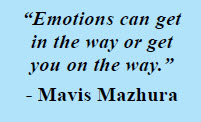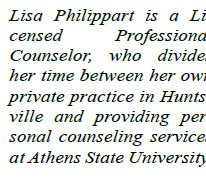 By: Lisa Philippart
By: Lisa Philippart
Everything from genetics to childhood experiences play some role in our emotional health. However, we don’t have a lot of control over the genes we inherited or the past we have lived through. All we have is the present and what we choose to do in it. If you want to feel better emotionally, the best place to start is by making small, consistent changes in your behaviors. Over time, these will become habits that keep you mentally strong and emotionally resilient. Begin by using specific language to talk about how you feel. Many adults are in the habit of overgeneralizing their word choices to describe their emotions. For example, you may be able to identify that you are feeling angry. But what is beneath that anger…is it frustration, hurt, resentment, bitterness, stress, shame, or even sadness?
From worry to rumination to self-criticism, we all fall into overthinking from time to time. The problem is that thoughts happen really fast in our heads. This overthinking can generate a lot of painful emotions in a short amount of time. Why not try doing your overthinking on paper? You can’t write nearly as fast as you think. By forcing yourself to overthink on paper, you allow yourself more time to validate the experience. Emotional validation (especially in writing) is like a pressure release valve for difficult feelings. You’ll be much more likely to react to that emotion productively if you’ve taken time to slow down and validate the feeling before you try to analyze it.
 We talk to ourselves all day long. This is called self-talk and it’s like the narrator of our lives. Unfortunately, for a lot of us, that narrator is pretty intense and harsh, even mean, much of the time. Start paying attention to your inner tone of voice. Replace that cruel speech with a gentler form of narration. Just because the origin of difficulty is in your head, it doesn’t mean the response needs to be. When people struggle with difficult thoughts or emotions, it’s natural to respond to them with more thinking. But often the best way to manage an emotionally difficult situation is to first move your body and change your environment. Go for a 5-minute walk or pick some weeds in the garden.
We talk to ourselves all day long. This is called self-talk and it’s like the narrator of our lives. Unfortunately, for a lot of us, that narrator is pretty intense and harsh, even mean, much of the time. Start paying attention to your inner tone of voice. Replace that cruel speech with a gentler form of narration. Just because the origin of difficulty is in your head, it doesn’t mean the response needs to be. When people struggle with difficult thoughts or emotions, it’s natural to respond to them with more thinking. But often the best way to manage an emotionally difficult situation is to first move your body and change your environment. Go for a 5-minute walk or pick some weeds in the garden.
 One of the great ironies of our time is that we’re more connected to each other than ever, yet we often feel isolated and alone. We’re constantly connected to coworkers through email and Zoom, but it’s been months since we have had a real conversation with a good friend. And as more and more shallow connections demand our attention, we must be more intentional about making space for deeper, more meaningful relationships. This might mean scheduling a regular call with a good friend, treating it like an appointment. Maybe it means one night a week turning off the TV and talking with your partner. Emotional health depends on social health. And social health depends on quality time, not just more connection.
One of the great ironies of our time is that we’re more connected to each other than ever, yet we often feel isolated and alone. We’re constantly connected to coworkers through email and Zoom, but it’s been months since we have had a real conversation with a good friend. And as more and more shallow connections demand our attention, we must be more intentional about making space for deeper, more meaningful relationships. This might mean scheduling a regular call with a good friend, treating it like an appointment. Maybe it means one night a week turning off the TV and talking with your partner. Emotional health depends on social health. And social health depends on quality time, not just more connection.
And finally, everyone self-sabotages. From breaking your diet with a sugary dessert to avoiding a difficult conversation, the tendency to act against your own best interests is incredibly common. But to break the cycle of self-sabotage requires not just that we are aware of these unhelpful tendencies, but also that we’re clear about what we really want. One way to avoid self-sabotaging behaviors and stick with our goals and commitments is to clarify the difference between immediate wants and long-term beliefs. Remind yourself of your values in the moment and you’ll have much more motivation to follow through on them. Being your best emotionally is rooted in living according to your principles.
By: Lisa Philippart
Licensed Professional Counselor










 June 20, 2025
June 20, 2025



